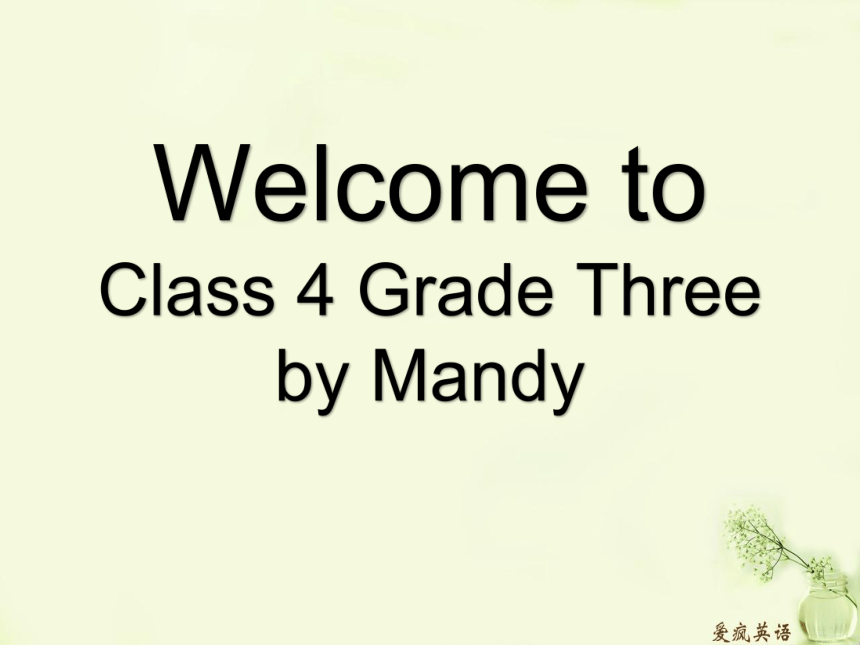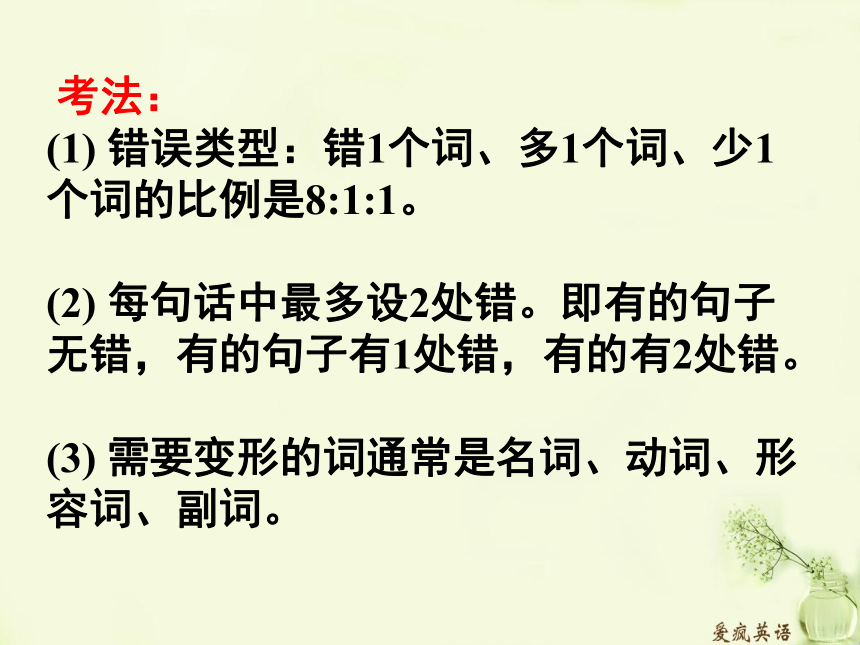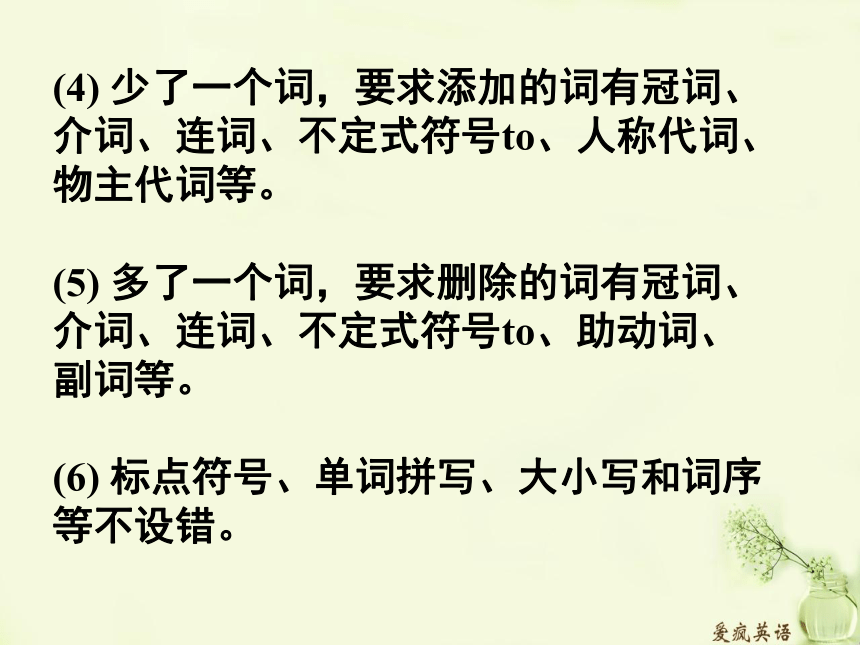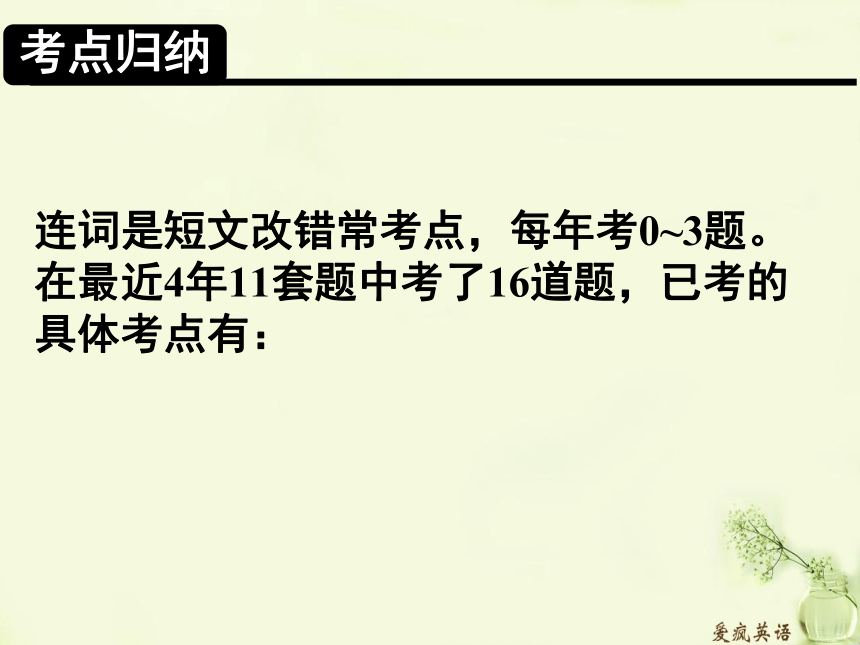高三复习课:短文改错之连词的误用、多用及少用 课件(33张PPT)
文档属性
| 名称 | 高三复习课:短文改错之连词的误用、多用及少用 课件(33张PPT) |

|
|
| 格式 | zip | ||
| 文件大小 | 292.0KB | ||
| 资源类型 | 教案 | ||
| 版本资源 | 通用版 | ||
| 科目 | 英语 | ||
| 更新时间 | 2020-03-09 00:00:00 | ||
图片预览












文档简介
(共33张PPT)
Welcome to
Class 4 Grade Three
by Mandy
连词的误用、多用与少用
短文改错 --
考法:
(1) 错误类型:错1个词、多1个词、少1个词的比例是8:1:1。
(2) 每句话中最多设2处错。即有的句子无错,有的句子有1处错,有的有2处错。
(3) 需要变形的词通常是名词、动词、形容词、副词。
(4) 少了一个词,要求添加的词有冠词、介词、连词、不定式符号to、人称代词、物主代词等。
(5) 多了一个词,要求删除的词有冠词、介词、连词、不定式符号to、助动词、副词等。
(6) 标点符号、单词拼写、大小写和词序等不设错。
考点分析
名词 代词 冠词 数词 介词 连词
I卷 2018 √ √ √ √√
2017 √ √ √ √ √
2016 √ √ √ √√√
2015 √ √ √ √ √
II卷 2018 √√ √ √ √√ √
2017 √ √ √ √√
2016 √ √ √ √√ √
2015 √ √ √ √ √
Ⅲ卷 2018 √ √ √√
2017 √ √ √ √√
2016 √ √√√ √ √
总 数 11份 10 10 10 1 12 16
别
点
考
份
卷
年
什么是连词?
连词是虚词,它不独立担任句子成份,只起到连接词与词,短语与短语和句与句的作用
连词的分类:
并列连词 and 等
从属连词when等
考点归纳
连词是短文改错常考点,每年考0~3题。在最近4年11套题中考了16道题,已考的具体考点有:
1. ( 2018年全国Ⅲ卷) Everyone was silent, waiting to see who would be called upon to read his and her paragraph aloud.
因主语是Everyone,此处表示“读他或她的段落”,应用连词or表选择。
or
真题再练
并列连词的误用、多用或少用
2. (2016全国Ⅰ卷) Every day he makes sure that fresh vegetables or high quality oil are used for cooking.
因“新鲜的蔬菜”与“优质的油”应为并列关系,在肯定句中,表示并列应用and。
and
3.(2015全国I卷) In the countryside, the air is clean or the mountains are green.
因“空气新鲜”与“山绿”是并列关系,而非选择关系。
and
归纳
or与and混用
4. ( 2018年全国Ⅰ卷) At the end of our trip, I told my father that I planned to return every two years, but he agreed.
因“我告诉父亲我计划每隔一年回乡下一次”与“他同意了”不是转折关系,不用but,而是顺承关系,故改为and。
and
5. (2016全国Ⅱ卷) If we stay at home, it is
comfortable but there is no need to spend money.
因“待在家里很舒服”与“没有必要花钱”是并列关系,故用and。
and
归纳
but与and混用
6. (2016全国Ⅰ卷) Though not very big,
but the restaurant is popular in our area.
在英语中,though与but不可连用,故应把but去掉。
7.(2014全国I卷) Although we allow tomato plants to grow in the same place year after year, but we have never had
any disease or insect attack problems.
因but不与although连用,须删除其中之一;又因删除Although,we不是大写字母开头,所以只能删除but。
归纳
but与though连用
8. (2013全国I卷) He had a deep voice, which set him apart from others in our small town, he was strong and powerful.
因删除非限制性定语从句which…town后,就是He had a deep voice, he was strong and powerful,显然两句之间缺少连词;从两句间的逻辑关系看,是并列关系,故用and。
and
(
)
归纳
并列连词漏用
1. ( 2018年全国Ⅰ卷) They also had a small pond which they raised fish.
which→where (或在which前加in) 因they raised fish主谓宾齐全,而which是代词,代词是要作主语或宾语等的,which一定是错了;“他们养鱼”应是“在池塘”里养,先行词是表示地点的a small pond(小池塘),故用作地点状语的关系副词where,或者在which前加in,in which =and in the pond。
where
真题再练
从句的引导词的误用
2. (2016全国Ⅰ卷) My uncle is the owner of a restaurant close to that I live.
介词to后应是宾语从句,在从句中作地点状语,用where,意为“……的地方”,close to where I live (离我住的地方不远的)是形容词短语作后置定语,修饰a restaurant。
where
3. ( 2018年全国Ⅱ卷) The games my parents taught me where I was a child turned out to
be very useful later in my life.
引导时间状语从句,表示“当……时”。
when
4. (2016全国Ⅱ卷) My classmates and I are
talking about how to do during the holiday.
因about后为宾语,这是“连接代词+不定式结构”作宾语,在此结构中do后缺宾语,要用连接代词what作其宾语。
what
5. (2015全国II卷) After looking at the toy for some time, he turned around and found where his parents were missing.
因found后是宾语从句,意为“他的父母不见了(his parents were missing)”,其结构与意义完整了,用that引导或省略that,故将where改为that,或删除where。
that
归纳
误用从句连词
6. (2017全国Ⅱ卷) In their spare time, they are interested in planting vegetables in their garden, that is on the rooftop of their house.
分析句子结构可知,这是一个非限制性定语从句。先行词为garden(花园),在从句做主语,故用关系代词which。
注意:引导非限制性定语从句不能用that。
which
7. (2013全国II卷) Having tea in the late
afternoon provides a bridge between lunch
and dinner, that might not be served until 8
o’clock at night.
引导非限制性定语从句不能用that。
which
归纳
误用that来引导非限制性定语从句
8. (2013全国I卷) In fact, he even scared
my classmates away during they came over
to play or do homework with me.
因during是介词,不能引导从句,应改为连词;从句意来看,应改为引导时间状语从句的when。
when
归纳
介词误作连词用
介词误作连词用,易混的还有表示“随着”的介词with与连词as;表示“在……期间”的介词during与连词while。介词后一般是接名词、代词或动名词作宾语,而连词才可以连接句子。
9. (2017全国Ⅰ卷) Before getting into the car, I thought I had learned the instructor’s orders, so once I started the car, my mind
went blank.
根据前后句意思可知这里表示转折概念,并非因果;所以把so改成but或yet。
but/yet
10. (2017全国Ⅲ卷) Around me in the picture are the things they were very important in
my life at that time: car magazines and musical instruments.
分析句子结构可知,这是一个定语从句,先行词为things,指物,且在从句中做主语,故用关系代词which或that。
which/that
其他情况
归纳
思路点拨
1. 句间无连词,增加连词。凡是两个句子之间没有句号、分号,又没有连词时,一定是漏掉连词了,要根据两句之间的意义关系或逻辑关系,增加一个恰当的连词.
2. 句间多连词,删除连词。虽然同一句子中的两个主谓关系之间一定有连词,但又不能多,只需一个,多了就错了。特别是受汉语的影响,误用作although /though… but(虽然……但是……), because /since /as…so (因为……所以……),遇到此种情况,一般删除后面的but, so, 以免影响一个句子的第一个单词首字母大写的原则。
3. 遇到连词要考究是否用错。如or (表选择:或者、否则), and (表顺承), but (表转折:但是)之间是否用错,要根据句意的理解、前后的逻辑关系去判断。
解题时,以下3点也需注意:
1. that的用法。
(1)引导名词性从句时没有任何意思,也不作任何句子成分,只起连接作用,引导宾语从句时常被省略。
(2)引导定语从句,如果不是直接在介词后,一般可以替代which, who或whom,但不能引导非限制性定语从句。
2. what的用法。是连接代词,引导名词性从句并在从句中作主语、宾语或表语,除表示“什么”外,还有“所……的(the thing that; the things that)”之类的意思。
3. 牢记平行结构。请翻译下列连词:
(1) 或者……或者…… ____________________
(2) 既不……也不…… ____________________
(3) 不但……而且…… ____________________
(4) 不是……而是…… ____________________
(5) 不论……还是…… ____________________
此外,在no sooner…than和hardly…when中,than与when不要用错。
记法:有比较级sooner,才用than。
whether…or…
either…or…
neither…nor…
not only…but also…
not…but…
1. He can not only swim and also play basketball. 2. In my opinion, our gratitude should first go to our parents because they not provide us with food and clothing but also care for us in many ways. 3. More importantly, I am lucky to have met many lovely teachers, who teach me only how to study, but also how to be a good person. 4. You can either go by train nor by subway. 5. No sooner had he arrived when he went away again.
Welcome to
Class 4 Grade Three
by Mandy
连词的误用、多用与少用
短文改错 --
考法:
(1) 错误类型:错1个词、多1个词、少1个词的比例是8:1:1。
(2) 每句话中最多设2处错。即有的句子无错,有的句子有1处错,有的有2处错。
(3) 需要变形的词通常是名词、动词、形容词、副词。
(4) 少了一个词,要求添加的词有冠词、介词、连词、不定式符号to、人称代词、物主代词等。
(5) 多了一个词,要求删除的词有冠词、介词、连词、不定式符号to、助动词、副词等。
(6) 标点符号、单词拼写、大小写和词序等不设错。
考点分析
名词 代词 冠词 数词 介词 连词
I卷 2018 √ √ √ √√
2017 √ √ √ √ √
2016 √ √ √ √√√
2015 √ √ √ √ √
II卷 2018 √√ √ √ √√ √
2017 √ √ √ √√
2016 √ √ √ √√ √
2015 √ √ √ √ √
Ⅲ卷 2018 √ √ √√
2017 √ √ √ √√
2016 √ √√√ √ √
总 数 11份 10 10 10 1 12 16
别
点
考
份
卷
年
什么是连词?
连词是虚词,它不独立担任句子成份,只起到连接词与词,短语与短语和句与句的作用
连词的分类:
并列连词 and 等
从属连词when等
考点归纳
连词是短文改错常考点,每年考0~3题。在最近4年11套题中考了16道题,已考的具体考点有:
1. ( 2018年全国Ⅲ卷) Everyone was silent, waiting to see who would be called upon to read his and her paragraph aloud.
因主语是Everyone,此处表示“读他或她的段落”,应用连词or表选择。
or
真题再练
并列连词的误用、多用或少用
2. (2016全国Ⅰ卷) Every day he makes sure that fresh vegetables or high quality oil are used for cooking.
因“新鲜的蔬菜”与“优质的油”应为并列关系,在肯定句中,表示并列应用and。
and
3.(2015全国I卷) In the countryside, the air is clean or the mountains are green.
因“空气新鲜”与“山绿”是并列关系,而非选择关系。
and
归纳
or与and混用
4. ( 2018年全国Ⅰ卷) At the end of our trip, I told my father that I planned to return every two years, but he agreed.
因“我告诉父亲我计划每隔一年回乡下一次”与“他同意了”不是转折关系,不用but,而是顺承关系,故改为and。
and
5. (2016全国Ⅱ卷) If we stay at home, it is
comfortable but there is no need to spend money.
因“待在家里很舒服”与“没有必要花钱”是并列关系,故用and。
and
归纳
but与and混用
6. (2016全国Ⅰ卷) Though not very big,
but the restaurant is popular in our area.
在英语中,though与but不可连用,故应把but去掉。
7.(2014全国I卷) Although we allow tomato plants to grow in the same place year after year, but we have never had
any disease or insect attack problems.
因but不与although连用,须删除其中之一;又因删除Although,we不是大写字母开头,所以只能删除but。
归纳
but与though连用
8. (2013全国I卷) He had a deep voice, which set him apart from others in our small town, he was strong and powerful.
因删除非限制性定语从句which…town后,就是He had a deep voice, he was strong and powerful,显然两句之间缺少连词;从两句间的逻辑关系看,是并列关系,故用and。
and
(
)
归纳
并列连词漏用
1. ( 2018年全国Ⅰ卷) They also had a small pond which they raised fish.
which→where (或在which前加in) 因they raised fish主谓宾齐全,而which是代词,代词是要作主语或宾语等的,which一定是错了;“他们养鱼”应是“在池塘”里养,先行词是表示地点的a small pond(小池塘),故用作地点状语的关系副词where,或者在which前加in,in which =and in the pond。
where
真题再练
从句的引导词的误用
2. (2016全国Ⅰ卷) My uncle is the owner of a restaurant close to that I live.
介词to后应是宾语从句,在从句中作地点状语,用where,意为“……的地方”,close to where I live (离我住的地方不远的)是形容词短语作后置定语,修饰a restaurant。
where
3. ( 2018年全国Ⅱ卷) The games my parents taught me where I was a child turned out to
be very useful later in my life.
引导时间状语从句,表示“当……时”。
when
4. (2016全国Ⅱ卷) My classmates and I are
talking about how to do during the holiday.
因about后为宾语,这是“连接代词+不定式结构”作宾语,在此结构中do后缺宾语,要用连接代词what作其宾语。
what
5. (2015全国II卷) After looking at the toy for some time, he turned around and found where his parents were missing.
因found后是宾语从句,意为“他的父母不见了(his parents were missing)”,其结构与意义完整了,用that引导或省略that,故将where改为that,或删除where。
that
归纳
误用从句连词
6. (2017全国Ⅱ卷) In their spare time, they are interested in planting vegetables in their garden, that is on the rooftop of their house.
分析句子结构可知,这是一个非限制性定语从句。先行词为garden(花园),在从句做主语,故用关系代词which。
注意:引导非限制性定语从句不能用that。
which
7. (2013全国II卷) Having tea in the late
afternoon provides a bridge between lunch
and dinner, that might not be served until 8
o’clock at night.
引导非限制性定语从句不能用that。
which
归纳
误用that来引导非限制性定语从句
8. (2013全国I卷) In fact, he even scared
my classmates away during they came over
to play or do homework with me.
因during是介词,不能引导从句,应改为连词;从句意来看,应改为引导时间状语从句的when。
when
归纳
介词误作连词用
介词误作连词用,易混的还有表示“随着”的介词with与连词as;表示“在……期间”的介词during与连词while。介词后一般是接名词、代词或动名词作宾语,而连词才可以连接句子。
9. (2017全国Ⅰ卷) Before getting into the car, I thought I had learned the instructor’s orders, so once I started the car, my mind
went blank.
根据前后句意思可知这里表示转折概念,并非因果;所以把so改成but或yet。
but/yet
10. (2017全国Ⅲ卷) Around me in the picture are the things they were very important in
my life at that time: car magazines and musical instruments.
分析句子结构可知,这是一个定语从句,先行词为things,指物,且在从句中做主语,故用关系代词which或that。
which/that
其他情况
归纳
思路点拨
1. 句间无连词,增加连词。凡是两个句子之间没有句号、分号,又没有连词时,一定是漏掉连词了,要根据两句之间的意义关系或逻辑关系,增加一个恰当的连词.
2. 句间多连词,删除连词。虽然同一句子中的两个主谓关系之间一定有连词,但又不能多,只需一个,多了就错了。特别是受汉语的影响,误用作although /though… but(虽然……但是……), because /since /as…so (因为……所以……),遇到此种情况,一般删除后面的but, so, 以免影响一个句子的第一个单词首字母大写的原则。
3. 遇到连词要考究是否用错。如or (表选择:或者、否则), and (表顺承), but (表转折:但是)之间是否用错,要根据句意的理解、前后的逻辑关系去判断。
解题时,以下3点也需注意:
1. that的用法。
(1)引导名词性从句时没有任何意思,也不作任何句子成分,只起连接作用,引导宾语从句时常被省略。
(2)引导定语从句,如果不是直接在介词后,一般可以替代which, who或whom,但不能引导非限制性定语从句。
2. what的用法。是连接代词,引导名词性从句并在从句中作主语、宾语或表语,除表示“什么”外,还有“所……的(the thing that; the things that)”之类的意思。
3. 牢记平行结构。请翻译下列连词:
(1) 或者……或者…… ____________________
(2) 既不……也不…… ____________________
(3) 不但……而且…… ____________________
(4) 不是……而是…… ____________________
(5) 不论……还是…… ____________________
此外,在no sooner…than和hardly…when中,than与when不要用错。
记法:有比较级sooner,才用than。
whether…or…
either…or…
neither…nor…
not only…but also…
not…but…
1. He can not only swim and also play basketball. 2. In my opinion, our gratitude should first go to our parents because they not provide us with food and clothing but also care for us in many ways. 3. More importantly, I am lucky to have met many lovely teachers, who teach me only how to study, but also how to be a good person. 4. You can either go by train nor by subway. 5. No sooner had he arrived when he went away again.
